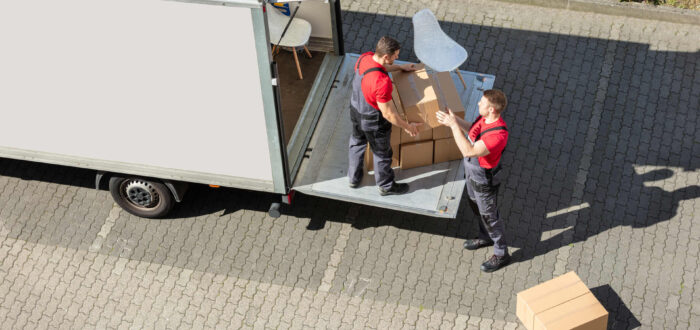

Ease and Care – Tailoring Moving Services for Seniors
Posted in Moving Essentials on March 13, 2024
As we age, certain tasks become more challenging. But let’s face it, moving cross-country has always been hard. From personal belongings that hold decades of memories to the setup of a new, cozy living space, long-distance moving services for seniors are a necessity for ensuring a gentle transition. Stay tuned as we uncover the advantageous secrets of relocation services for the elderly, one perk at a time.
Moving With Grace – Addressing the Unique Relocation Needs of Our Senior Citizens
Americans are constantly on the move, with recent data highlighting intriguing trends among different age groups.
Recent studies by the US Census Bureau show that 15% of Millenials and 12% of Gen Z are leading the pack in mobility.
This makes perfect sense, as these transient age groups are probably relocating to college or in pursuit of a job in a new city.
Despite this, the data reveals that annually, over 3 million individuals aged 65 and older embark on the same journey to a new home.
Why is it that seniors tend to stay put, and what drives the considerable few to take the leap and move across the country? Well, many of them have spent decades cultivating comfort and memories in their homes, making the idea of switching things up a distant consideration.
However, downsizing for seniors can bring plenty of benefits, as well as relocating closer to family or communities better suited to their lifestyle and health needs. All in all, as with any age group, there are many reasons to move even for our oldest citizens.
There Needs to Be a Lot of Customized Planning Involved in the Whole Ordeal
When it comes to senior moving assistance, a one-size-fits-all approach just doesn’t cut it. Creating a customized plan to move becomes crucial to address numerous specific needs and concerns:
- Assessment of health and mobility needs in regard to both the process of moving across the country and the new living arrangement,
- Ensuring the new home is equipped with necessary modifications or amenities to support safe and comfortable living,
- Help with downsizing and sorting belongings in order to lighten the load,
- Choosing the right location considering proximity to family, healthcare services, and community resources,
- Financial planning, and not just for the relocation budget but also for any changes in the cost of living.
Don’t Forget About the Emotional Considerations as Well
Beyond the logistical and practical aspects of planning, this whole ordeal can be an emotionally charged experience, laden with memories and the relocation stress that comes with change. Providing emotional support, ensuring clear communication, and involving seniors in decision-making can help mitigate these negatives and make the transition smoother.

How to Choose the Right Cross-Country Moving Services for Seniors and Have a Smooth Transition
Both emotionally and physically, the strain of relocating to another state can be super demanding. Because of this, hiring reliable long-distance movers can be especially beneficial. With the vast array of moving services at your disposal, you’ll be able to have much-needed assistance with packing, lifting, and unpacking.
How to Find Senior-Friendly Moving Companies Right for the Job
Choosing the right company isn’t as simple as a quick online search for “moving services for seniors near me”. The process requires thoughtful consideration to make sure you’re dealing with movers who are not just capable but also understanding of the unique needs. Here are some questions to guide the search:
- What is the company’s experience with senior moves?
- What kind of reviews and testimonials do they have?
- Do they offer a detailed and transparent quote?
- Are they licensed and insured?
- How do they handle special requests or needs?
Discuss the Services and Elderly Moving Support You’ll Need to Make This Leap
Boxing all of your belongings for the move can be one of the most physically taxing and emotionally draining parts of the whole ordeal. It involves sorting through years, sometimes decades, of precious memories. Because of that, getting comprehensive packing services from a senior-friendly company such as Cross Country Movers is the way to go.
They will take care to handle every one of your possessions with the respect and attention it deserves, even your most fragile items. On top of that, storage solutions can be a great option for those who have a slight gap in the timeline between the old and the new house.
Preparing for the Big Move – Here’s How to Turn the Most Dreaded Part Into a Smooth Process
With professionals by your side, the mountainous task ahead starts to look more like a manageable hill. While you don’t have to lift a finger, there are still some things you can take on your own if you’re up for it and able. Here are some ideas with a few relocation hacks to match:
Start by Downsizing and Organizing Your Belongings
One of the first steps in preparing for movers is to downsize and organize your belongings. This is especially important for seniors who may have accumulated many items over the years. Take this time to sort through your possessions, deciding what to get rid of, donate, sell, or throw away.
Downsizing can significantly reduce the load of the move and make unpacking in your new home much easier. Organizing your belongings by categories such as clothes, books, and kitchen items can also streamline the whole process, making it easier for you and your movers to know where everything goes.
If Possible, Pack Your Prized Possessions Yourself
While professionals can handle most of the packing, there’s a certain peace of mind that comes from personally taking care of your most prized possessions. These could be family heirlooms, important documents, or items of sentimental value. With a couple of packing tips for the elderly under your belt, you’ll be able to properly wrap and secure all of your valuables, reducing the risk of damage during transit.
Make Sure You’ll Be Comfortable and Safe When the Big Day Comes
The actual moving day can be hectic and physically demanding, even if you’re not doing the heavy lifting. To ensure your comfort and safety, plan ahead for the day. If possible, arrange for a comfortable place to rest away from the chaos of boxes and furniture.
Keep essential items like medications, a change of clothes, snacks, and water easily accessible. Also, consider your physical well-being by avoiding heavy lifting and ensuring clear paths to navigate safely around your home.
Post-Move Setup for Seniors – Settling Into Your New Abode With Ultimate Comfort and Ease
Once you’ve reached your new destination, it might feel like a huge sigh of relief. But the journey to making this space your own is just beginning. After all, this is the perfect opportunity to set you off on the right foot for this exciting upcoming chapter of your retired life.
Unpacking and Setting up Is All About Creating Comfort
Creating a comfortable living space is done by thoughtfully placing furniture to facilitate easy movement and access, and organizing your daily essentials where they can be easily reached. Think about the placement of items in a way that reduces the need for bending or reaching. It’s also the perfect time to implement any necessary adjustments or add assistive devices that make your living space more senior-friendly.
Look at This as a New Beginning and Start Getting to Know Your Environment
Relocating isn’t just a change of address – it’s a doorway to new experiences and opportunities. Viewing your move as a fresh start can be incredibly empowering. Here are some avenues to explore in your new environment:
- Join local community centers where you can meet peers and participate in various activities,
- Explore nearby parks or walking trails for exercise and fresh air,
- Visit local libraries or book clubs to find new reads and like-minded enthusiasts,
- Check out local hobby or craft groups that align with your interests,
- Get involved with volunteer opportunities to give back and connect with your new community.
Embrace the Change While Making Sure You Stay Connected
Above all, embrace this change with an open heart and mind, remembering that staying connected to your loved ones is key. Technology can play a vital role here, allowing you to easily keep in touch through calls, video chats, and social media.
At the same time, make an effort to build new connections in your community. This balanced approach ensures you’ll have a support system that’s both familiar and new, making your transition smoother and more enjoyable.

Emotional Well-Being During Relocation Is the Most Important Thing – Let Us Handle the Rest
As we wrap up our venture into senior relocation planning, it’s clear that there are a couple of vital considerations that play into the whole ordeal. Health, emotional, and physical needs are definitely at the top of the priority list, as this move should be about enhancing your quality of life in the first place.
As you’re thinking about how to approach this life-altering event, remember that you don’t have to do it alone. Our team at Cross Country Movers has plenty of experience with compassionate and customized services tailored specifically for senior citizens. Contact us today to learn more about how we can help you transition smoothly to your new home, ensuring comfort, safety, and peace of mind.
Frequently Asked Questions
What Should I Look for in a Moving Company That Specializes in Senior Relocation?
Seek a company with a strong track record of catering to senior needs, offering personalized and compassionate services. They should provide clear communication, and a full range of services, and have experience in handling the unique challenges of relocating the elderly.
How Can Seniors Make Downsizing Easier Before a Move?
Start the downsizing process early, categorizing items to keep, donate, sell, or discard. Consider enlisting help from family or professional organizers, focusing on what’s essential for the new space and also keeping sentimental items to a manageable amount.
What Packing Strategies Are Best Suited for Seniors?
Packing should be done gradually, with clear labeling on boxes for easy identification and unpacking. Use sturdy, manageable-sized boxes and avoid overpacking to keep them light, ensuring essentials are packed last and unpacked first to maintain comfort and familiarity.
How Can Moving Day Be Made More Comfortable and Safe for Elderly Individuals?
Ensuring the big day is safe includes frequent breaks, easy access to essentials like medications and water, and clear paths free of obstacles to prevent falls. Having a familiar face, whether a family member or a friend, can also provide emotional support and assistance.
What Steps Can Be Taken to Help Seniors Adjust Quickly to Their New Home?
Prioritize setting up the living area to feel familiar and cozy, using personal and cherished items to decorate. Introduce seniors to their new community, facilities, and local activities suited to their interests, and encourage them to establish routines to feel at home quickly.







